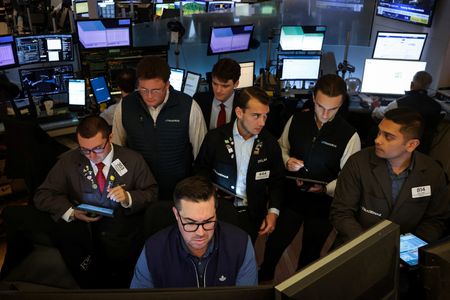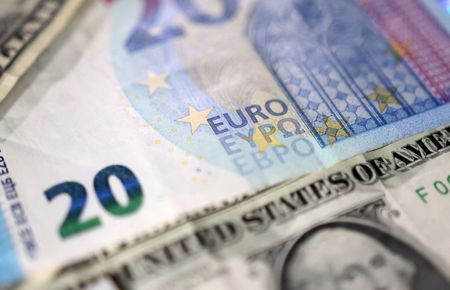By Sinéad Carew and Nell Mackenzie
NEW YORK/LONDON (Reuters) -Global equities declined on Tuesday as U.S. investors awaited earnings reports due this week from megacap companies along with the Federal Reserve’s next policy decision, while oil prices jumped as the U.S. threatened China with higher tariffs if it keeps buying Russian oil.
Oil prices soared by more than $2 after U.S. Treasury Secretary Scott Bessent said China could see high tariffs if it continues to buy oil from Russia. He made the threat after saying that two days of U.S.-China trade talks in Stockholm had been very constructive.
Bessent’s comments followed a threat from U.S. President Donald Trump that the U.S. would start imposing tariffs and other measures on Russia “ten days from today” if Moscow did not make progress toward ending the war in Ukraine.
The dollar advanced against the euro, which hit its lowest point since June 23 and was on track for its fourth straight day of losses as investors sobered up to the fact that the new U.S.-EU trade deal favoured the United States and did little for the 27-nation bloc’s economic outlook.
While monitoring trade updates, investors were also preparing for inflation and payroll reports as well as quarterly results from large companies such as Microsoft, Meta Platforms, Apple and Amazon.
And as if this wasn’t enough to worry about they are also waiting for the Fed’s policy statement and commentary, due on Wednesday afternoon following the U.S. central bank’s two-day meeting. The Fed is widely expected to keep interest rates steady, pending more clarity on the impact of tariffs on inflation, even with constant demands from Trump for rate cuts.
“Trading is biased to the upside. But given that we have a barrage of information coming in over the next couple days, traders and investors are going to be a little bit hesitant,” said Anthony Saglimbene, chief market strategist at Ameriprise.
The S&P 500 registered record closing highs in the last six sessions. On Tuesday, the index breached 6,400 for the first time before pulling back due to “a little bit of psychological hesitancy” about moving past the big round number, Saglimbene said.
The strategist also pointed to signs of pressure from tariffs in quarterly results. United Parcel Service <UPS.N> reported quarterly profit marginally below estimates and did not issue annual revenue and margin forecasts. Procter & Gamble <PG.N> on Tuesday forecast annual results largely below estimates and said it would raise prices on some products in the U.S. to steer it through tariff uncertainty.
While traders have been betting the Fed will make its next rate cut in September, they will carefully monitor the week’s data for signs of inflation or job market weakness. Canada’s central bank also convenes Wednesday and is widely expected to also hold rates steady.
On Wall Street the S&P 500 snapped six sessions of gains, falling 18.91 points, or 0.30%, to 6,370.86 while the Nasdaq Composite saw its first daily loss in five trading days, falling 80.29 points, or 0.38%, to 21,098.29. Dow Jones Industrial Average fell 204.57 points, or 0.46%, to 44,632.99.
MSCI’s gauge of stocks across the globe fell 3.19 points, or 0.34%, to 936.18 for its third straight day of losses.
Earlier, the pan-European STOXX 600 index closed up 0.33% after falling on Monday.
TARIFF ECHOES
A U.S.-EU trade deal, announced on Sunday, included 15% tariffs on EU imports to the U.S. and bolstered expectations that more such agreements will follow ahead of Trump’s August 1 deadline for trade deals. Trump also flagged a “world tariff” rate of 15%-20% on all trading partners that were not negotiating a deal – among the highest rates since the Great Depression of the 1930s.
In currencies, the dollar index, which measures the greenback against a basket of currencies including the yen and the euro, rose 0.27% to 98.88.
The euro was down 0.31% at $1.1552. But against the Japanese yen, the dollar weakened 0.04% to 148.47.
In U.S. Treasuries, yields slid across the board, reversing the previous session’s gains, after a less-than-stellar report on job openings for June and ahead of Wednesday’s Fed decision and a government announcement of financing plans for this quarter.
The yield on benchmark U.S. 10-year notes fell 9.8 basis points to 4.322%, from 4.42% late on Monday while the 30-year bond yield fell 10.7 basis points to 4.8583% from 4.965%.
The 2-year note yield, which typically moves in step with interest rate expectations for the Federal Reserve, fell 4.9 basis points to 3.873%, from 3.922% late on Monday.
In energy markets, oil prices, already extending Monday’s rally due to supply concerns related to Trump’s threats against Russia, jumped another leg higher after Bessent’s comments.
U.S. crude settled up 3.75%, or $2.50 at $69.21 a barrel, while Brent settled at $72.51 per barrel, up 3.53%, or $2.47, on the day.
Gold prices rose as markets turned their focus to trade talks and the Fed’s policy decision.
Spot gold rose 0.35% to $3,325.62 an ounce.
(Reporting by Sinéad Carew in New York, Nell Mackenzie in New York; Editing by Mark Heinrich, Nick Zieminski and Daniel Wallis)










